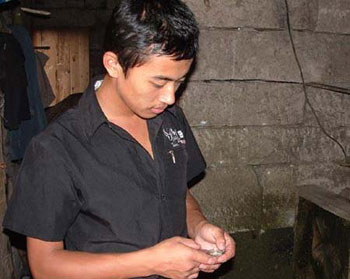|
Rural Chinese pay price for ambition
By Catherine Armitage (The Australian)
Updated: 2005-10-24 08:45
A month ago, farmer Xie Guangfu paused outside his front door at
midnight, 18 hours into his usual 21-hour working day, and died with a heavy
load of wheat on his shoulder.

Xie Zhonghua, son
of Xie Guangfu who died of overstrain
to support his son's university education,
fingers a wrist watch left by his father.
[sina] |
Xie's family was the poorest in
their remote village about 100km from the western city of Chongqing. Yet it was
also the most successful, by traditional Chinese standards, because the son Xie
Zhonghua got into university, a rare feat in these parts.
But university fees, at 6000 yuan ($990) a year, far exceeded the family's
annual income of 1000 yuan. They had already borrowed from friends and relatives
just to keep the boy at school. With his wife not well enough to work the
fields, the father worked their land and took whatever jobs he could pick up
from other farmers, planting, harvesting, carrying wheat and feeding pigs from
daylight to 3am each day.
Xie originally baulked at the idea of his son attending college because of
the expense, but his friends, and families in the village of Qianqiu talked him
into it, they now admit ruefully.
He worked hard but was physically weak because often all he ate was rice, to
save money, they said. By the time he died, the family was 20,000 yuan in debt.
"Now they simply don't know how and when they can pay back the debt," the
dead farmer's older brother, Xie Guangxin, said. But as he observes, for the Xie
family and hundreds of millions like them in rural China, the quest for
education adds up to a horrible equation: "The more school you have, the more
debt you have."
Figures released last week by the National Bureau of Statistics confirmed
China's economy continued to roar ahead at 9.4per cent growth for the first nine
months of the year. But rural incomes are stuck at less than a third of city
incomes, the NBS figures show.
The Government, concerned that the yawning rich-poor gap could feed social
unrest, has just issued a new five-year plan for 2006-2010, stressing the need
to accelerate rural reform and "promote social harmony", the official news
agency Xinhua said.
The plan, which reiterates government policy dating back to 2003,
promises to overhaul the rural tax system, invest more in agriculture and
experiment with new models of farm ownership.
It also talks about the need to "step up education (as) the ultimate way to
transform China's population pressure to advantageous human resources".
Though it mentions the need to "speed up adjustment of the educational
structure", the plan bypasses the root cause of the city-rural gulf access to
health and education: local governments are mandated to provide them, but lack
the fiscal revenues to pay for them. So far, the central Government has lacked
the mettle to reorganise the fiscal system to force the rich provinces to share
revenue with their poor counterparts.
In Chongqing, the dead farmer's son, Xie Zhonghua, lowers his eyes and
mumbles his sorrow when offered condolences. With two years of his four-year
course still to go, spending just 10 yuan a day on meals and skipping breakfast
to save money, he's not sure how long he can last. He worries about his mother.
He's hoping a part-time job will come up soon, but they're scarce.
"All I can do is take each step and see what the next
step is," he says. One of his friends told his story to a newspaper in the hope
of drawing donations. But stories like his are becoming a cliche in China, and
it appears donor fatigue has set in. They got 6000 yuan, enough for one year's
fees.
|